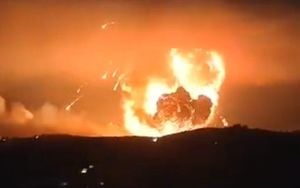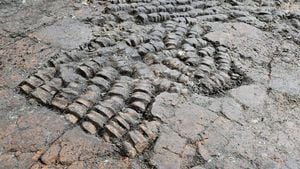Mayotte, the French overseas department situated near Madagascar, is grappling with the aftermath of Cyclone Chido, which hit the island with unprecedented ferocity, sparking fears of hundreds, even thousands of fatalities. With wind gusts exceeding 220 kilometers per hour, Chido has been declared the most devastating cyclone to strike the region in nearly a century.
Initial reports confirm at least 14 deaths and 250 injuries, but local authorities caution these figures are likely to rise dramatically. François-Xavier Bieuville, the prefect of Mayotte, warned, “I believe there are several hundred deaths, perhaps approaching one thousand,” highlighting the chaos encompassing the efforts to tally casualties.
The cyclone devastated infrastructure, obliterated homes, and disrupted communication lines across the island, leaving many residents isolated. “The situation is apocalyptic,” voiced Bieuville as he assessed the destruction, citing entire neighborhoods of makeshift houses and shanties flattened.
Chido's assault on Mayotte, marked by its uncontrolled winds and chaotic aftermath, raised alarms over humanitarian needs. Many vulnerable inhabitants, living atop precarious hills, faced catastrophe head-on, enduring extreme poverty prior to the cyclone. Bruno Retailleau, the interim Minister of the Interior, emphasized the dire conditions stating, “We anticipate it will take several days to establish the total human toll.”
Approximately 100,000 residents are expected to have no access to water or electricity, adding compounded difficulties to the survival efforts. Some families were forced to bury their deceased loved oneswell within 24 hours, owing to Islamic customs prevalent among the majority Muslim population.
“Many of us have lost everything,” lamented one local woman, tears brimming as she reflected on her new reality. Reports indicated total destruction of villages, with desperate families searching through rubble for signs of life.
French President Emmanuel Macron pledged swift governmental action after convening with rescue teams and announcing the deployment of military aid, including 800 police officers and firefighters, to assist with the humanitarian crisis and restore order. This response came as panic gripped residents fearing looting amid widespread devastation.
Images from French civil protection authorities highlighted extensive damage, with rescue operations commencing immediately to tackle the debris-littered streets and clear the blocked roads. Yet, obstacles remain as remote communications impede rescue efforts, with many areas still unreachable.
Mayotte, home to about 320,000 people, is known for its pressing social issues, including violence and chronic water shortages—all exacerbated by this recent disaster. Historically the most impoverished region of France, it relies heavily on the mainland for support and resources, making this disaster particularly alarming for its recovery prospects.
Just as attention turned to Mayotte, the focus shifted upon reports of the cyclone moving toward northern Mozambique where it continued to wreak havoc. With winds now reaching 260 kilometers per hour, the neighboring regions brace for significant jeopardy and more logistical challenges for aid organizations. Guy Taylor from UNICEF expressed concern, stating, “The immediate effects of this cyclone include the potential for widespread loss of lives and destruction of schools and health facilities.” He stressed the urgency for immediate assistance to prevent long-term repercussions, such as the spread of waterborne diseases.
Experts have pointed out the increasing intensity of cyclones affecting the regions, attributing this trend to climate change as proponents voice their fears about worsening natural disasters ravaging already impoverished communities. “We need to brace ourselves for more severe weather phenomena,” urged numerous analysts.
Insistent calls for more proactive international aid follow suit with the impending threat of cholera and malaria outbreaks looming, particularly due to stagnant water which could promote disease proliferation. The UN Office for Coordination of Humanitarian Affairs (OCHA) is among those emphasizing the urgency of bolstered international support for vulnerable populations across Southern Africa.
With aid pouring in from France and surrounding territories, including medical personnel and humanitarian supplies, the affected regions still find themselves contending with fundamental vulnerabilities worsened by the relentless cyclone. “We are moving to establish emergency shelters for many families, yet the loss of contact and unclear situational reports hinder recovery efforts,” shared Bieuville.
The combined calamities brought forth by Cyclone Chido epitomize the larger challenges endemic to Mayotte and surrounding regions, representing both socioeconomic conditions and climate vulnerabilities. Past experiences reiterate the necessity of adaptive strategies, proactive governmental policies, and urgent global cooperation to mitigate the repercussions of nature's wrath.
Looking toward recovery, local leaders, alongside global aid organizations, push for immediate response measures and long-term rebuilding plans to restore the fabric of this devastated community. Every moment paves the road toward healing and stabilizing the lives forever changed by the cyclone’s destructive path.



